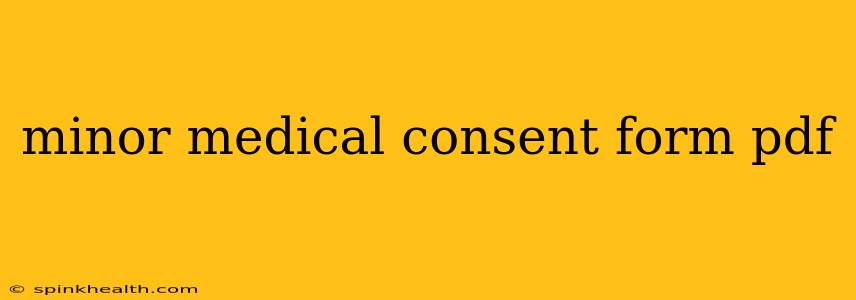Navigating the World of Minor Medical Consent: A Comprehensive Guide
The need for a minor medical consent form often arises when a young person requires medical attention but isn't legally able to provide consent themselves. This can be a complex area, fraught with legal and ethical considerations. This guide aims to illuminate the process, demystifying the often-confusing aspects of obtaining proper medical consent for minors.
Imagine this: 15-year-old Sarah needs treatment for a serious injury. Who can give consent for her care? This seemingly simple question opens a Pandora's Box of legal nuances and parental responsibilities. Understanding the process is critical for both medical professionals and families alike.
What is a Minor Medical Consent Form?
A minor medical consent form is a legal document that authorizes a healthcare provider to administer medical treatment to a person under the legal age of majority (typically 18 years old). It's not a simple "yes" or "no" but a detailed authorization encompassing the specifics of the procedure, including potential risks and benefits. The form serves as crucial legal protection for both the healthcare provider and the minor's legal guardian.
Who Can Give Consent for a Minor's Medical Treatment?
This is where things get interesting. Generally, the legal guardian, usually a parent or court-appointed guardian, holds the authority to consent to medical treatment for a minor. However, the specifics can vary widely based on several factors including:
-
The minor's age and maturity: In some cases, mature minors, those who demonstrate a sufficient understanding of the medical procedure and its implications, might be allowed to consent for themselves, especially for certain types of treatment (e.g., reproductive health care). This is often determined on a case-by-case basis by the healthcare provider.
-
The type of medical treatment: Emergency situations often supersede the need for formal consent. If a minor is in immediate danger, treatment will be provided to save their life, regardless of whether consent has been formally obtained. The healthcare provider's judgment is paramount in these situations.
-
State and local laws: Laws regarding minor consent vary significantly from state to state and even within different localities. Some states have specific laws allowing minors to consent to certain types of medical care, such as reproductive healthcare or mental health treatment, regardless of parental involvement.
What Information is Typically Included in a Minor Medical Consent Form?
A comprehensive minor medical consent form should include:
- The minor's identifying information: Full name, date of birth, address, and contact information.
- The parent or guardian's identifying information: Full name, address, and contact information.
- A detailed description of the proposed medical treatment: This includes the procedure itself, its purpose, potential risks, benefits, and alternatives.
- The parent or guardian's signature and date: This signifies their consent to the treatment.
- Witness signatures: Many forms require witness signatures to validate the consent.
- Healthcare provider's information: Name, contact details, and signature acknowledging receipt of the consent.
Where Can I Find a Minor Medical Consent Form?
Specific forms can vary based on the healthcare provider and the state’s laws. It's always best to contact the healthcare provider or hospital directly to obtain the appropriate form.
Can I Create My Own Minor Medical Consent Form?
Creating your own form is generally not recommended. Using a form provided by a healthcare facility ensures compliance with all relevant regulations and legal requirements. Improperly drafted forms can lead to legal complications.
This information is for educational purposes only and does not constitute legal advice. Always consult with a legal professional or healthcare provider for advice specific to your situation. The laws and regulations concerning minor medical consent are intricate and require careful consideration.

